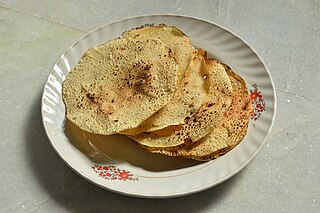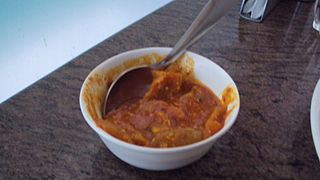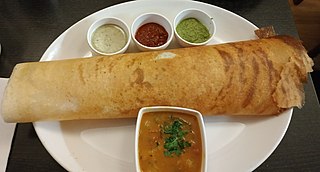
Andhra Pradesh is a state in the southern coastal region of India. It is the seventh-largest state with an area of 162,970 km2 (62,920 sq mi) and the tenth-most populous state with 49,577,103 inhabitants. It shares borders with Chhattisgarh, Odisha, Karnataka, Tamil Nadu, Telangana and the Bay of Bengal. It has the second-longest coastline in India at about 974 km (605 mi). After existence as Andhra State and unified Andhra Pradesh, the state took its present form on 2 June 2014, when the new state of Telangana was formed through bifurcation. Amaravati is the capital of the state, with the largest city being Visakhapatnam. Water sharing disputes and asset division with Telangana are not yet resolved. Telugu, one of the classical languages of India used by the majority of people, is the first official language.

A mango is an edible stone fruit produced by the tropical tree Mangifera indica. It originated from the region between northwestern Myanmar, Bangladesh, and northeastern India. M. indica has been cultivated in South and Southeast Asia since ancient times resulting in two types of modern mango cultivars: the "Indian type" and the "Southeast Asian type". Other species in the genus Mangifera also produce edible fruits that are also called "mangoes", the majority of which are found in the Malesian ecoregion.

Ugadi or Yugadi, also known as Samvatsarādi, is New Year's Day according to the Hindu calendar and is celebrated in the states of Andhra Pradesh, Telangana, Karnataka and Goa in India. The cycle actually consists of 60 years, each year individually named. The first day of each year is called 'Ugadi'. The word Ugadi can be split into two: Uga means Course of Stars and Adi means Starting. It is festively observed in these regions on the first day of the Hindu lunisolar calendar month of Chaitra. This typically falls in late March or early April of the Gregorian calendar. It also falls during the Tamil month of either Panguni or Chithrai, sometimes on the day after Amavasya with 27th Nakshatra Revati. Ugadi day is pivoted on the first New Moon after March Equinox.

Rangoli is an art form that originates from the Indian subcontinent, in which patterns are created on the floor or a tabletop using materials such as powdered lime stone, red ochre, dry rice flour, coloured sand, quartz powder, flower petals, and coloured rocks. It is also similar to a rug/carpet. It is an everyday practice in many Hindu households, however making it is mostly reserved for festivals and other important celebrations as it is time-consuming. Rangolis are usually made during Diwali or Tihar, Onam, Pongal, and other Hindu festivals in the Indian subcontinent, and are most often made during Diwali. Designs are passed from one generation to the next, keeping both the art form and the tradition alive.

A papadam, also known as papad, is a snack that originated in the Indian subcontinent. Dough of black gram bean flour is either deep fried or cooked with dry heat until crunchy. Other flours made from lentils, chickpeas, rice, tapioca, millet or potato are also used. Papadam is typically served as an accompaniment to a meal in India, Pakistan, Bangladesh, Nepal, Sri Lanka and the Caribbean or as an appetizer, often with a dip such as chutneys, or toppings such as chopped onions and chili peppers, or it may be used as an ingredient in curries.

Rajasthani cuisine is the cuisine of the Rajasthan state in North West India. It was influenced by various factors like the warlike lifestyles of its inhabitants, the availability of ingredients in an arid region and by Hindu temple traditions of sampradayas like Pushtimarg and Ramanandi. Food that could last for several days and could be eaten without heating was preferred. Scarcity of water and fresh green vegetables have all had their effect on the cooking. Signature Rajasthani dishes include Dal Baati Churma, Panchratna Dal, Papad ro Saag, Ker Sangri, Gatte ro Saag. It is also known for its snacks like Bikaneri bhujia, Mirchi bada and Kanda kachauri. Other famous dishes include Dal Baati, malaidar special lassi (lassi) and Lashun ki chutney, Mawa lassi from Jodhpur, Alwar ka mawa, Malpauas from Pushkar and rasgulla from Bikaner, "paniya"and "gheriya" from Mewar. Originating for the Marwar region of the state is the concept Marwari Bhojnalaya, or vegetarian restaurants, today found in many parts of India, which offer vegetarian food of the Marwari people. The history also has its effect on the diet as the Rajputs preferred majorly a non-vegetarian diet while the Brahmins, Jains, Bishnois and others preferred a vegetarian diet. So, the state has a myriad of both types of delicacies.

Curd rice, also called yogurt rice, is a dish originating from India. The word "curd" in Indian English refers to unsweetened probiotic yogurt. It is most popular in the South Indian states of Tamil Nadu, Kerala, Karnataka, Telangana and Andhra Pradesh; and also in West Indian states of Rajasthan, Gujarat and Maharashtra.
Maharashtrian or Marathicuisine is the cuisine of the Marathi people from the Indian state of Maharashtra. It has distinctive attributes, while sharing much with other Indian cuisines. Traditionally, Maharashtrians have considered their food to be more austere than others.

Nuzvid, natively spelled Nuzividu or Nuziveedu is a city in the Eluru district of the Indian state of Andhra Pradesh. It serves as the administrative headquarters for Nuzvid mandal and Nuzvid revenue division.

South Asian pickle is a pickled food made from a variety of vegetables and fruits preserved in brine, vinegar, edible oils, and various South Asian spices. The pickles are popular across South Asia, with many regional variants, natively known as lonache, avalehikā, uppinakaayi, pachadi or noncha, achaar, athāṇu or athāṇo or athāna, khaṭāī or khaṭāin, sandhan or sendhan or sāṇdhāṇo, kasundi, or urugaai.

Indian breads are a wide variety of flatbreads and crêpes which are an integral part of Indian cuisine. Their variation reflects the diversity of Indian culture and food habits.

Krishnagiri is a city in the state of Tamil Nadu, India, and it serves as the administrative headquarters of Krishnagiri District formed in 2004. It is located at the bottom of Krishnadevaraya Hills, and the town is fully surrounded by hill rocks. It is located 250 km from Chennai, 45 km from Dharmapuri, and 90 km from Bengaluru. Krishnagiri is known as "Mango Capital of India" as mangoes are cultivated as the main crop, and the land here is extremely fertile with rich access to fresh water making it amenable to growing crops. Krishnagiri is the site of significant business and residential development. The Krishnagiri Dam was built in 1967.

The culture of Andhra Pradesh embodies some very exclusive and special entities.

Banganapalle mangoes is a mango variety produced in Banganapalle of Nandyal District in the Indian state of Andhra Pradesh.It's also state fruit of Andhra. It alone occupies 70% percent of total mango cultivable area of the state and was first introduced by the farmers of Banaganapalli. It was registered as one of the geographical indication from Andhra Pradesh on 3 May 2017, under horticultural products by Geographical Indication Registry. It is also grown in the other parts of India and Pakistan. The fruit is described as obliquely oval in shape, around 20cm in length, with yellow flesh and a thin, smooth yellow skin. The flesh is of a firm, meaty texture and is sweet and lacks fibre. The cultivar is the most sought after in Andhra Pradesh. It is a very late-season variety that is good for canning. This cultivar is a source of vitamin A & C and is also called king of Mangoes.

The economy of the Indian state of Andhra Pradesh is primarily dependent on agriculture, which directly and indirectly employs 62% of the population. GSDP as per the first revised estimate, for the year 2023-24 is ₹15,40,000 crore.The state is ranked 1st in the country for the year 2021-22 in terms of the Gross State Domestic Product (GSDP) growth at constant prices with growth rate of 11.43%. The state GSDP is expected to grow at a rate of 17% for the year 2023-24.

A mango pickle is a variety of pickle prepared using mango. It is very popular in South and Southeast Asia. These sour/spicy pickles are also available commercially.

Andhra cuisine, culturally known as Telugu cuisine, is a cuisine of India native to the state of Andhra Pradesh and is the culinary style of Telugu people. It is generally known for its tangy, hot, and spicy taste.
Paper Boat is a brand of traditional Indian beverages and foods produced and marketed by Hector Beverages, which is headquartered in Bengaluru, India.

Haji Kalimullah Khan, popularly known as Mango man, is an Indian horticulturist and fruit breeder, known for his accomplishments in breeding mangoes and other fruits. He is known to have grown over 300 different varieties of mangoes on a single tree, using grafting techniques. Born in Malihabad, near Lucknow in the Indian state of Uttar Pradesh, Khan dropped out of school at 7th standard and took to the family business of farming. Using the asexual propagation technique of grafting, he has developed several new varieties of mangoes, some of which has been named after celebrities and political leader such as Sachin Tendulkar, Aishwarya Rai, Akhilesh Yadav, Sonia Gandhi, Narendra Modi, Amit Shah etc. Anarkali, a variety of mango developed by him is reported to have two different skins and two different layers of pulp, each having a different taste. The Government of India awarded him the fourth highest civilian honour of the Padma Shri, in 2008, for his contributions to horticulture.

Kasundi is the Bengali variety of mustard sauce or relish. It has the pungent paste of fermented mustard seeds, spices and sometimes dried mangoes, dried Indian plum and olives. Kasundi is popular as a dipping sauce in Bengali cuisine.






















